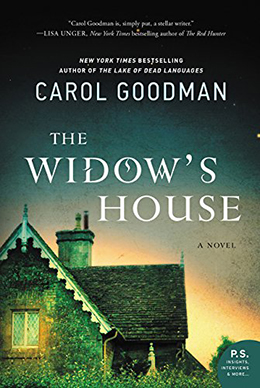Diehard fans of contemporary gothic suspense likely know the name Carol Goodman, but based on her consistently superior writing, recurring themes, and complex characters and plots, this author should be better known to crime fiction enthusiasts. The Widow’s House is another in a long line of excellent novels that can be traced back to Goodman’s first book, The Lake of Dead Languages – one of the strongest debut novels from the 2000’s.
The Widow’s House is the story of Clare and Jess Martin, a married couple who leave their Brooklyn home to return to the Hudson River Valley area. Both are originally from the area and spent their formative college years there and now with a need to rejuvenate their lives (and careers), it seems like the perfect solution. A return “home.”
 Alden Montague was not only a professor to both Jess and Clare; he also became Jess’s professional rival after a scathing review of the young man’s breakout novel. So when the Martin’s discover that Montague needs a caretaker for his old home – Riven House – both of them know it is probably not the best fit, but it also seems like too good a deal to pass up (after all, money is tight).
Alden Montague was not only a professor to both Jess and Clare; he also became Jess’s professional rival after a scathing review of the young man’s breakout novel. So when the Martin’s discover that Montague needs a caretaker for his old home – Riven House – both of them know it is probably not the best fit, but it also seems like too good a deal to pass up (after all, money is tight).
In typical Carol Goodman fashion, what follows is a tightly-constructed story in which past and present blend – old secrets are revealed, family legacies exposed, and trust becomes a commodity no one seems willing to invest in. Ghosts of Riven House – both literal and figurative – haunt Clare as she struggles to reconcile her beliefs with her current reality.
There are multiple references to Charlotte Perkins Gilman’s “The Yellow Wallpaper” throughout The Widow’s House. Fans of that classic story will see its reflections within Clare Martin’s life. The isolation of this secluded estate along with her own traumatic history cause Clare to begin to question her own sanity, which inevitably leads to paranoia and panic.
There is a lot of backstory to absorb in The Widow’s House, but readers who track the complex familial relations within this town are rewarded with some genuine surprises and a resolution that has both horror and heart. Carol Goodman excels at crafting strong, self-sufficient women; and while Clare has many self-doubts, she also embodies the soul of a survivor and readers will be rooting for her.
Another theme that runs through much of Carol Goodman’s work is the presence of artistic personalities– and most especially, writers. Like many of her other novels, The Widow’s House details how inspiration works, the fragility of the creative mind, and the ultimate power of stories. These are elusive topics to cover, but Carol Goodman nails their expression and spins a web that seduces the reader into understanding. Simply stated: To read one of Carol Goodman’s novels is to become a fan for life.
Buy Links: The Widow’s House by Carol Goodman
